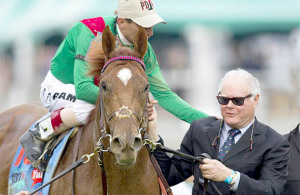Racing needs to wean itself off race day medication. Various reasons have been proffered for the elimination of drugs on race day, but there is one rarely mentioned that encompasses another major problem hurting the well-being of our industry – a lack of owners willing to play the game, writes Barry Irwin.
Let me explain. Believe it or not, people that aspire to ownership in racehorses do not contemplate the endeavour because of any promised pot of gold at the end of the rainbow. They want to race horses because of pride of ownership. I did not come up with this notion off the top of my head. I am now in my fourth decade of bringing owners into the game. So I write from experience.
The vast majority of new owners I’ve met are men. But make no mistake – very, very, very few men are able to own a horse unless their wives give them the green light. I have dealt with male owners from heads of Fortune 500 companies to men that deliver their mail. I have involved elected members of the Federal government, heads of motion picture studios and Wall Street power brokers, as well as people that tapped out their credit cards to fund their acquisitions. Nearly every one of these guys needed to have their wives on board.
In most cases, in order to justify to their spousal units or themselves on some primal level, these men have deluded themselves or tricked their wives into believing that racing made sense from an economic standpoint. But, in real life – when push comes to shove – the actual reason these fellows buy into the idea of racehorse ownership has to do with pride of ownership. Lots of times, when I first speak with a prospective racing partner, he will bring up the subject of that elusive pot of gold. He will try to convince me that he is not like all of my other investors, because unlike them, this guy will sell a good horse, take the money and run. I try not to laugh. Then I tell him that I am going to let him in on a little secret. I tell him that he is not going to believe what I am about to tell him and then I lay it on him. I tell him that, if he is lucky, a horse will come along that he owns and win a race so impressively that somebody will make a substantial offer to buy it. And when the inevitable vote takes place to decide whether the group will sell, he will be among the majority that votes no! And the reason the vote will be in the negative, except when the offer made is for an aged campaigner, is that the true motivation behind the fellow to get involved in racehorse ownership is pride of ownership.
Pride of ownership manifests itself in many ways. There is the satisfaction that the owner has selected the right horse. There is the pure, unadulterated and unmatched thrill of watching the horse win. There is the bond between human and animal. There are the inevitable bragging rights. Money runs a poor second to any of these trappings that come along with pride of ownership. This is so because, as we have witnessed forever, money in and of itself cannot buy the experience of winning a horse race.
What in the hell does this have to do with race day medication, you may be wondering by now? Just this – that in order for anybody to want to get involved in the challenge of becoming a racehorse owner, the sport must be worthy enough of the owners’ support. Few prospects for racehorse ownership want to be involved in a sport that is perceived by the public to have cooties.
Third generation Kentucky breeder John Greathouse once told me that Thoroughbred racing made a big mistake when – unlike other equine sports such as dressage, jumping and showing – we held out the promise that people could make money racing horses. He was right, of course. But the genie has been out of the bottle too long for us to be able to stuff that imposter back where he came from. So the only way we can combat it is to be as realistic as possible with new owners and emphasize the intangible aspects of the sport which, in fact, form the meat of what these folks are looking for in the first place.
Racing for profit, it seems, is pretty much an American concept. Racing in Europe, for example, is about the sport and not the prize money. Medications used on race days should be banned if for no other reason than public perception, because until we stop giving it to our horses on the day of competition, we will continue to be portrayed – and rightly so in my opinion – as not conducting a proper sport and abusing animals.
By and large horsemen and vets are in favour of meds, whereas a growing number of owners are not. Interestingly, all three groups came to racing because of a love of the sport and the animal. But horsemen and vets have goals that often are in direct conflict with what may be best for the owners and their horses. Every trainer and every vet knows in their heart of hearts when a horse should not be competing and when that horse can use a rest. But because of economic pressures, they have, in many instances, been able to convince themselves that their actions are appropriate.
Horsemen, vets and owners all know what the right thing to do is with their horses. The dilemma is this – do we want a sport that is presented in the fairest manner with the healthiest horses involved, or do we merely want to push the envelope for as long and hard as we can before this whole thing blows up in our faces?
We have lost a lot of owners. You will hear many different reasons offered why this is the case. Of course, the biggest reason one hears is that the expenses far outweigh the rewards. I believe there is some merit to this argument. But I would say that the reason for loss in the ranks of owners is due more to the general economic climate than the specific dollar figures of our sport. I would also humbly suggest to you that we have lost countless owners, and several trainers as well, because there is a perception among them that the runaway use of medications (both known and unknown) have tilted the playing field against them. When people don’t want to play the game anymore, it behooves those in power to make changes to consider altering the rules in order to elevate the sport and make it as attractive as possible for new participants.
That time is at hand. Let’s make racing something we can be proud of without reservation.
(source: TDN)









